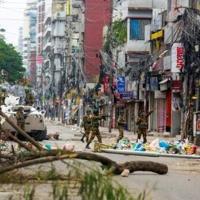Bangladesh’s top court made changes to controversial civil service hiring rules on Sunday, but this did not satisfy university student leaders. Their protests against the scheme have led to national clashes that resulted in 155 deaths.
What started as a demonstration against politicized admission quotas for government jobs escalated into severe unrest this week during Prime Minister Sheikh Hasina’s term.
With riot police unable to restore order, soldiers are now patrolling cities across Bangladesh. Additionally, a nationwide internet blackout since Thursday has greatly limited the flow of information to the outside world.
The Supreme Court was originally set to rule next month on the legality of the recently reintroduced scheme that reserves over half of government jobs for specific applicants. However, due to the escalating civil unrest, the court advanced its verdict.
The court deemed the reintroduction of the scheme “illegal”, according to Bangladeshi Attorney General A.M. Amin Uddin.
Shah Monjurul Hoque, a lawyer involved in the case, informed AFP that the court also urged protesting students to go back to class after issuing its verdict.
The court reduced the number of reserved jobs from 56 percent to seven percent of all positions, but this fell short of the protester’s demands.
It allocated five percent of government jobs for the children of “freedom fighters” from Bangladesh’s 1971 liberation war against Pakistan, down from the previous 30 percent.
One percent of jobs were reserved for tribal communities, and another one percent for individuals with disabilities or those identifying as a third gender under Bangladeshi law.
The court ruled that the remaining 93 percent of positions would be determined based on merit.
The category of “freedom fighters” has been a point of contention among young graduates, as critics claim it’s used to fill public jobs with supporters of Hasina’s Awami League.
Students demanded the complete elimination of that category and other quotas for women and specific districts in the country.
“We appreciate the Supreme Court’s decision,” a representative from Students Against Discrimination, the main group behind the protests, told AFP anonymously. “But we will not end our protests until the government issues an order reflecting our demands.”
– ‘Our demand is one point’ –
Critics accuse Hasina’s government of influencing the judiciary, and the Prime Minister had hinted earlier this week that the court would rule in favor of student demands.
Hasina, who has been in power since 2009 and won her fourth consecutive election in January, has come under scrutiny from rights groups for allegedly misusing state institutions to maintain her authority and suppress dissent, including the extrajudicial killing of opposition activists.
“It’s no longer about the rights of the students,” said 24-year-old business owner Hasibul Sheikh to AFP at a Saturday street protest in Dhaka amid a nationwide curfew. “Our demand is now one point, and that’s the resignation of the government.”
– ‘Made the situation worse’ –
The reintroduction of the quota scheme deeply upset graduates in a country with around 18 million unemployed young people, according to government data.
Hasina aggravated tensions by likening protesters to collaborators with Pakistan during Bangladesh’s independence war earlier this month.
“Instead of addressing the grievances of the protesters, the government’s actions have exacerbated the situation,” said Crisis Group’s Asia director Pierre Prakash to AFP.
Since Tuesday, at least 155 individuals, including several police officers, have died in clashes around Bangladesh, as reported by police and hospitals to AFP.
– Curfew extended –
Police have detained several members of the main opposition party, Bangladesh Nationalist Party (BNP), and Students Against Discrimination. Home Minister Asaduzzaman Khan mentioned that the curfew imposed on Saturday would continue “until the situation improves.”
Alongside the torching of government buildings and police stations by protesters, arson attacks have rendered Dhaka’s metro rail unusable, Khan stated, attributing the destruction to the BNP and Islamist party Jamaat.
The US State Department cautioned Americans against traveling to Bangladesh and stated that it would begin evacuating some diplomats and their families due to the civil unrest.
India and Nepal indicated they were assisting in repatriating their citizens, with nearly 800 Indian students returning home by Saturday.
“They were ready to harm each other, which is frightening,” 24-year-old student Shivam Kumar Shah, who flew back from unrest at his Dhaka university, expressed concern to AFP at Kathmandu Airport. “An environment meant for learning and wisdom has transformed into a battleground, and that is lamentable.”
bur-gle/dhw





